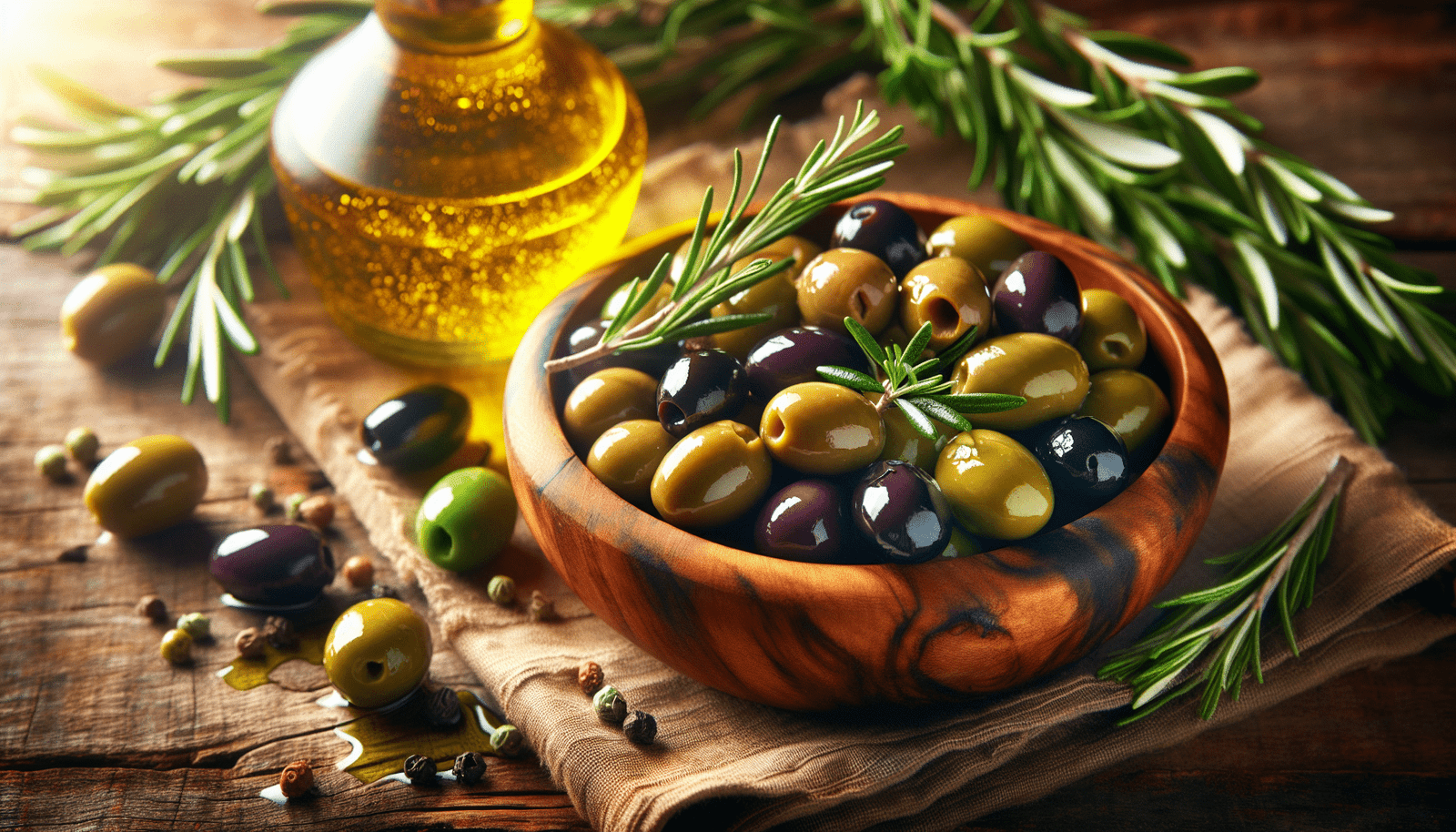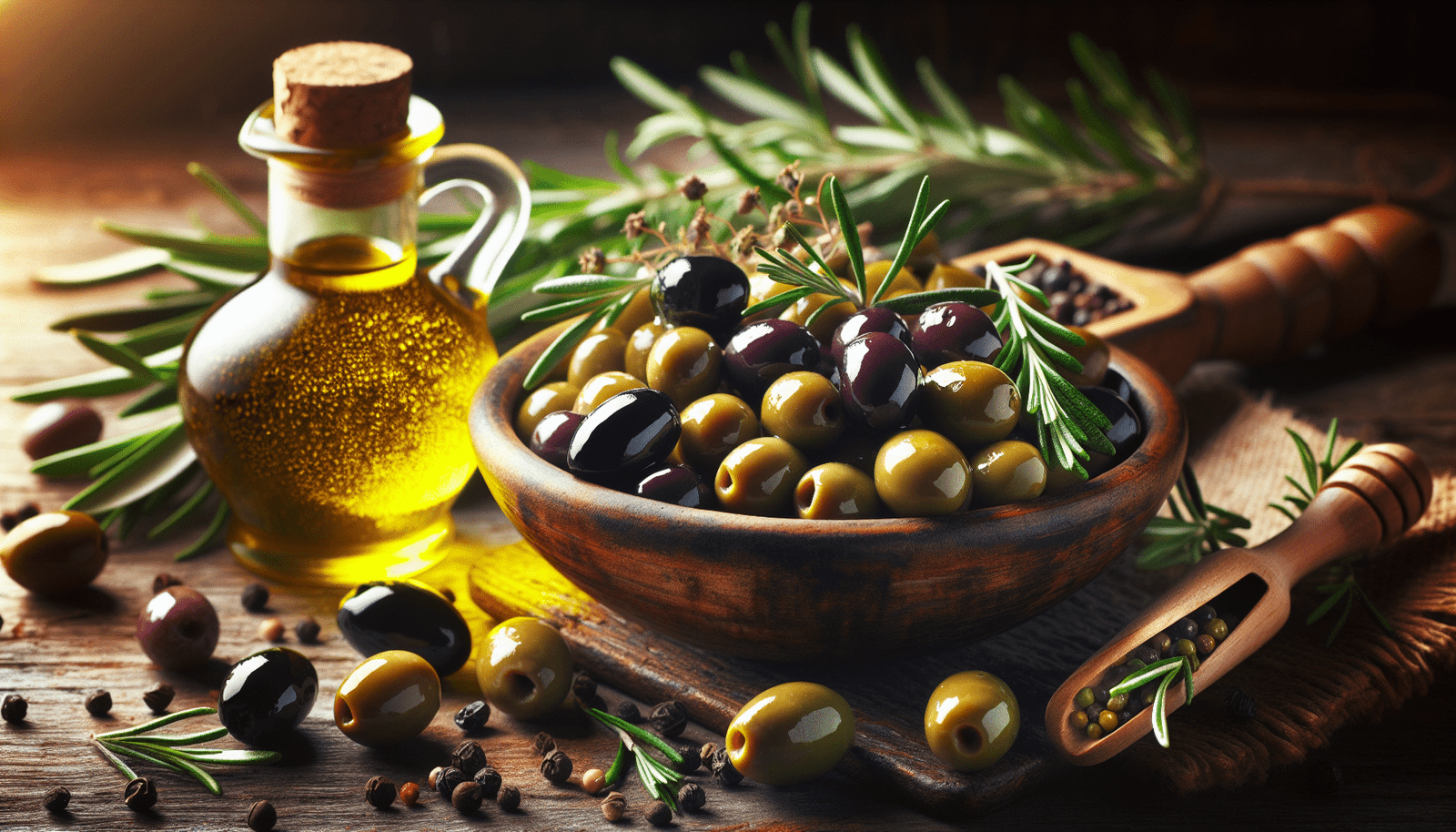Are olives and olive oil staples of the Mediterranean diet? If you’ve ever savored a sun-drenched olive or drizzled rich olive oil over your dish, you already know how special these staples are. The Mediterranean diet isn’t just about delicious flavors; it’s also a way of life packed with health benefits. Let’s journey through the vital roles olives and olive oil play in this popular way of eating.

The Essence of the Mediterranean Diet
The Mediterranean diet originates from the culinary practices of countries bordering the Mediterranean Sea. It is characterized by a high intake of fruits, vegetables, whole grains, legumes, nuts, and healthy fats, particularly olive oil. This diet emphasizes balance and sustainability, encouraging you to enjoy food in a social setting.
Key Components of the Mediterranean Diet
- Fruits & Vegetables: Rich in vitamins, minerals, and antioxidants.
- Whole Grains: Sources of fiber and energy.
- Legumes & Nuts: Provide protein and healthy fats.
- Fish & Poultry: Lean sources of protein.
- Dairy: In moderation, often in the form of cheese or yogurt.
- Olive Oil: The crown jewel of healthy fats in this diet.
Olives and olive oil are more than just condiments; they are essential, nutritious components of this dietary lifestyle.
Olives: Nature’s Perfect Snack
Historical Significance
Olives have a rich history, dating back thousands of years. They were revered by ancient civilizations, including the Greeks and Romans, who recognized their nutritional value and versatility. These small fruits carry cultural significance and find their way into traditional dishes, making them a beloved staple of the Mediterranean lifestyle.
Nutritional Profile of Olives
Olives come with a host of health benefits. Here’s a quick look at what makes them worth including in your diet:
| Nutrient | Amount per 100g |
|---|---|
| Calories | 115 |
| Total Fat | 10.7 g |
| Saturated Fat | 1.4 g |
| Monounsaturated Fat | 7.8 g |
| Polyunsaturated Fat | 0.7 g |
| Carbohydrates | 6.0 g |
| Fiber | 3.3 g |
| Protein | 0.8 g |
| Vitamin E | 1.65 mg |
| Iron | 3.3 mg |
Olives are generally low in carbohydrates and high in healthy fats, making them a smart choice for those looking to maintain or lose weight.
Health Benefits of Olives
-
Rich in Antioxidants: Olives are packed with antioxidants, which help fight free radicals in your body. This is important for reducing inflammation and preventing chronic diseases.
-
Heart Health: The healthy fats in olives can help reduce bad cholesterol levels while increasing good cholesterol levels, lowering your risk of heart disease.
-
Anti-Inflammatory Properties: The compounds found in olives can help reduce inflammation, which is linked to various chronic conditions like arthritis.
-
Bone Health: The polyphenols in olives can contribute to improved bone density.
Types of Olives
You might have noticed various types of olives at your local market. Here are some of the most common varieties you might encounter:
| Olive Type | Description |
|---|---|
| Manzanilla | Small, green, and slightly nutty flavor. |
| Kalamata | Dark purple to black; fruity and rich taste. |
| Ascolano | Large, meaty olives that are creamy in texture. |
| Castelvetrano | Green olives with a sweet, buttery flavor. |
| Gaeta | Small black olives with a mild, subtle taste. |
Knowing the different types of olives can help you make informed choices depending on the dish you’re preparing.

Olive Oil: Liquid Gold
The Production Process
Olive oil production is a beautiful blend of art and science. It involves harvesting olives, crushing them, and extracting the oil, ensuring that you get the purest flavor and nutrients. The process can vary, with differing techniques impacting the oil’s taste and quality.
Types of Olive Oil
Like olives, olive oils are not created equal. Here’s a glimpse into the various types you might encounter:
| Type | Description |
|---|---|
| Extra Virgin | Highest quality; made from pure, cold-pressed olives. |
| Virgin | Good quality but may have slight defects. |
| Pure | A blend of refined olive oil and virgin varieties. |
| Light or Extra Light | Refined oil with a milder flavor and higher smoke point. |
Choosing extra virgin olive oil is generally your best bet for health benefits and flavor.
Health Benefits of Olive Oil
Olive oil is often heralded as a superfood. Here’s why it’s deemed beneficial:
-
Rich in Healthy Fats: Extra virgin olive oil is predominantly monounsaturated fat, which is heart-healthy and can assist in weight management.
-
Antioxidants: It’s not just the olives that are full of antioxidants; olive oil is rich in vitamins E and K, which protect your cells.
-
Anti-Inflammatory Effects: The polyphenols in olive oil help combat inflammation, benefiting those with chronic conditions.
-
Improved Brain Health: Studies suggest that the nutrients in olive oil may help stave off Alzheimer’s disease and cognitive decline.
Cooking with Olive Oil
The versatility of olive oil makes it a staple in the kitchen. Here are some popular uses:
- Salad Dressings: Whisk olive oil with vinegar or lemon juice for a healthy dressing.
- Marinades: Use it to marinate meats or vegetables for an added flavor boost.
- Drizzling: A simple drizzle over cooked vegetables or pasta elevates the dish.
- Sautéing: Perfect for low-to-medium heat cooking.
However, be mindful of cooking with olive oil. While it has a relatively high smoke point, it’s best used for lower heat applications to preserve its nutritional content.

Integrating Olives and Olive Oil into Your Diet
Meal Ideas
Want to get started on incorporating olives and olive oil into your meals? Here are several ideas:
- Breakfast: Add sliced olives to your omelets or scrambled eggs for a savory twist.
- Lunch: Toss olives into a Mediterranean-style salad featuring tomatoes, cucumbers, and feta cheese, drizzled with olive oil.
- Dinner: Use olive oil as a base for sauces, or drizzle it over grilled fish with herbs and lemon.
- Snacks: Enjoy marinated olives as a snack paired with whole-grain crackers.
Storage Tips
To maintain the freshness of your olives and olive oil, here are some handy storage tips:
-
Olives: Keep them in a sealed container in the refrigerator. If they are stored in brine, ensure the liquid covers the olives.
-
Olive Oil: Store olive oil in a dark glass bottle away from light and heat to preserve its quality.

Conclusion
Olives and olive oil are indeed vital components of the Mediterranean diet, not only for their delightful flavors but also for their remarkable health benefits. By including these powerhouses in your meals, you embrace a culinary tradition that fosters well-being, heart health, and enjoyment.
So, the next time you sit down for a meal, consider adding some olives or a drizzle of olive oil. You’ll not only enhance your dishes but also nourish your body in the process. After all, a healthy diet is best enjoyed together, and there’s no better company than the delicious offerings of the Mediterranean diet!



